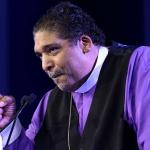I recently realized that one popular theory holds that the book of Malachi may have been written by Ezra. This isn’t a new idea — it gets kicked around in one ancient targum, and St. Jerome apparently liked the idea too. So I wanted to take a moment to explain why this is a silly idea that is very, very wrong.
I appreciate that it’s February 6, 2017, and so it seems like other matters are a bit more urgent just now than weighing in on a speculative debate about the authorship of Malachi. We have an addled narcissist as president, spouting racist fantasies while ceding day-to-day control of the government to his top aide, a white-supremacist and self-described “Leninist.” The president is actively undermining the legitimacy of the judiciary and the rule of law, flirting with a constitutional crisis that threatens the very fabric of our democracy. So a discussion of the authorship of one of the least remarkable of the minor prophets may seem like an exercise in denial or misplaced priority.
But hang in there, because I think this is actually rather relevant to the current moment in history. We’re talking about Ezra, and that means we’re talking about tribalism, Herrenvolk religion, mass-deportation, and theocratic fascism.
At a popular level, American evangelicals tend to believe that every book of the Bible was written by its title character. Thus, with a very few exceptions, they just assume that “Isaiah” wrote Isaiah, “Daniel” wrote Daniel, “Jonah” wrote Jonah, etc. (This is true even when, as in that last example, this makes about as much sense as assuming that Harry Potter wrote Harry Potter.) So if you ask most church-going folk who wrote Malachi, they’ll tell you it has to be “Malachi.”
But that turns out not to be a name so much as a title. It means “The Messenger.” Granted, that might be somebody’s name, but it’s more likely that it’s a pen-name. A pen-name for who? Ah, good question. We don’t know. Given the age of the book, or at least the time period it discusses, some folks think it might be a pen-name used by Ezra.
And that’s wrong. Malachi can’t have been written by Ezra because Malachi was written, at least in part, against Ezra.

This is relatively obscure stuff even for people who once competed on their Bible Quiz teams, but even if that’s not you, you’re probably familiar with at least one verse from Malachi because of the way it gets weaponized and wielded as a clobber-text club. That’s Malachi 2:16: “For I hate divorce, says the Lord, the God of Israel, and covering one’s garment with violence, says the Lord of hosts.”
This little tangent in Malachi railing against divorce seems to come out of nowhere. The rest of the book is pretty standard minor prophet fare, railing against the people of Israel for their lack of faith and their failure to live up to their covenant with God. And then, all of a sudden, Malachi starts ranting about the disgrace of divorce, talking about it like there was some kind of epidemic wave of divorce, with all the men of Israel lining up, day after day, to divorce their wives en masse by the thousands.
That seems kind of weird, until you realize that what Malachi is talking about is exactly that — an epidemic wave of divorce, with all the men of Israel lining up, day after day, to divorce their wives en masse by the thousands.
Malachi — “the Messenger,” whoever that was — is responding to the events described in the final chapters of the book of Ezra.
That weird, ugly story tends to get overlooked. The preachers who love to cite Malachi 2:16 in their own rants about the evils of divorce never seem to notice the earlier biblical passage Malachi is reacting against. This is partly because the clobber-text hermeneutic sold under the brand of “biblical inerrancy” is concordance-driven, and the god-awful atrocities described in the final chapters of Ezra don’t come up when you do a concordance search of the word “divorce” in your KJV or NIV English translations.
That’s why if you ask these clobber-texting preachers what the Bible has to say about divorce they’ll turn only to those verses that employ the word “divorce” in our English translations. In a sense, that’s partly a good thing, since it keeps them from answering that question by citing the book of Ezra, wherein mass divorce, including the abandonment of thousands of children, is presented as a necessary act of obedience to God.
Lest you think I’m overstating this, let’s take a look at the story from Ezra. It is horrible and horrifying. Ezra 9 is Ezra’s first-person account of his (self-)righteous disgust at learning that Israelites had failed to separate themselves from other peoples. They have intermarried with “unclean” others, failing to “never seek their peace or prosperity,” and thus filled the land with unclean Moabite wives and their unclean mudblood Moabite children.
Ezra is still sitting there in his elaborate mourning for this unclean ethnic compromise — lamenting this turn of affairs like Jonah under his bush — when the men of Israel approach him with a potential solution in the beginning of chapter 10:
Shecaniah son of Jehiel … addressed Ezra, saying, “We have broken faith with our God and have married foreign women from the peoples of the land, but even now there is hope for Israel in spite of this. So now let us make a covenant with our God to send away all these wives and their children, according to the counsel of my lord and of those who tremble at the commandment of our God; and let it be done according to the law. Take action, for it is your duty, and we are with you; be strong, and do it.” Then Ezra stood up and made the leading priests, the Levites, and all Israel swear that they would do as had been said. So they swore.
Catch that? Everybody gets divorced and sends away their children. Thousands of them. This takes months to carry out.
It was the ninth month, on the twentieth day of the month. All the people sat in the open square before the house of God, trembling because of this matter and because of the heavy rain. Then Ezra the priest stood up and said to them, “You have trespassed and married foreign women, and so increased the guilt of Israel. Now make confession to the Lord the God of your ancestors, and do his will; separate yourselves from the peoples of the land and from the foreign wives.”
Then all the assembly answered with a loud voice, “It is so; we must do as you have said. But the people are many, and it is a time of heavy rain; we cannot stand in the open. Nor is this a task for one day or for two, for many of us have transgressed in this matter. Let our officials represent the whole assembly, and let all in our towns who have taken foreign wives come at appointed times, and with them the elders and judges of every town, until the fierce wrath of our God on this account is averted from us.”
… Ezra the priest selected men, heads of families, according to their families, each of them designated by name. On the first day of the tenth month they sat down to examine the matter. By the first day of the first month they had come to the end of all the men who had married foreign women.
Yeah, that’s in the Bible. Month after month, day after day, men standing in the rain to have Ezra divorce them from their wives, sending those women and their own children away. Away to where? Just away — to poverty, de facto widowhood and orphanhood. To be cast out as outcasts by the thousands.
Do you find that appalling? Does that strike you as immoral and hateful? Does Ezra’s insistence that this atrocity be conducted in the name of devotion to God seem like utter blasphemy to you?
It should. That reaction is right and proper — and that reaction, too, is all over the Bible. That’s why the writer of Malachi has God saying, in direct refutation of Ezra, that “The man who hates and divorces his wife … does violence to the one he should protect.”
And Malachi is hardly alone in that. The biblical canon is full of writers explicitly and directly condemning Ezra. Consider, for example, the fierce satire of the book of Jonah, written to lampoon and ridicule exactly the attitude and actions described in the final chapters of Ezra.
Or turn to the book of Ruth. You got a problem with Moabite wives and their children? OK, here’s a story where the hero is a Moabite wife. And her children? That’s the line of David.
Ever wonder why the Gospels of Matthew and Luke bother getting bogged down in those genealogies of Jesus? It’s partly because of the whole Davidic lineage business, but it’s also partly because of Ruth and thus, because of how utterly, grossly wrong Ezra was.
So yeah, in other words, if you’re into the whole clobber-text thing (which you shouldn’t be) and you’re hunting for a chapter-and-verse trump card to explain why a ban on refugees is immoral and ungodly and “unbiblical,” then feel free to cite Matthew 1:5-6: “and Salmon the father of Boaz by Rahab, and Boaz the father of Obed by Ruth, and Obed the father of Jesse, and Jesse the father of King David.”
Ruth, mofos. A Moabite wife. And her child was the grandfather of King David. And that means Ezra was wrong wrong wrong wrongitty wrong.
All of which is to say that, no, Ezra is not the “Messenger” who wrote the book of Malachi. The author of Malachi didn’t much care for Ezra. And you shouldn’t either.
If the authors of Jonah and Malachi and Matthew and Luke are correct, then here’s the big practical application moral lesson you should be taking from the book of Ezra: Don’t be like Ezra. Instead, be like Jonathan and Jahzieah, Meshullam and Shabbethei — the only heroes you’ll find in that book.
As Ezra carries out his mass-divorce, mass-child-abandonment scheme of ethnic cleansing, Ezra 10:15 tells us, “Only Jonathan son of Asahel and Jahzeiah son of Tikvah opposed this, and Meshullam and Shabbethai the Levites supported them.”
It’s fascinating to me that we have their names, and that their opposition is recorded there almost as a badge of honor. That’s enough to make me suspect that Ezra may not have written the book of Ezra either.
















